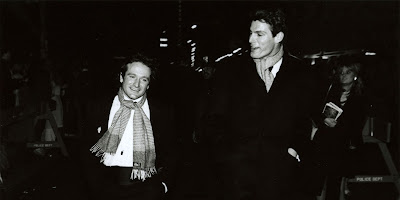or
"And Then She Said the Words That Saved My Life: 'You're Still You and I Love You.'"
I assume everybody knows the story: Christopher Reeve, Broadway actor, was picked to play "Superman" in the 1978 movie of the same name—bulked up strenuously to do it—and essayed the role through four films, while also choosing to be in other projects that were farther afield to prevent type-casting. Then, a horse-riding accident left him paralyzed from the neck down—"It's what happens when the trap-door opens and the noose tightens"—unable to breathe without assistance. The doctors gave him a 50/50 chance to live through the night. His older son says that the doctors "re-attached his head to his body."
And then he got to work.
Reeve became the best-known advocate for spinal chord injuries and despite his touch-and-go condition, he and his wife Dana, would go anywhere, meet anyone who could write a check, provide a medical path, raise awareness. He also managed to act...and direct projects...totally confined to a wheel-chair, unable to support his neck, breathing with a respirator. 10 short months after his accident, he appeared on-stage in a wheelchair at the Oscar ceremony...and cracked jokes.
And the prevailing wisdom became "If he wasn't Superman before, he sure is now."
His story, with the full cooperation of the Reeve children, his former partner Gae Exton, DC Studios, Warner Brother studios, and anyone who had footage of the man has been released as a "Fathom Event"—one of those special piped-in presentations to a theater environment—and called Super/Man: The Christopher Reeve Story. It makes use of a lot of home-movie footage, contemporary interviews with friends and family, doctors, experts, and archival footage, an amazing curating job executed by directors Ian Bonhôte and Peter Ettedgui.
Reeves' tragic accident—which, when you see it, looks so flukish—raised awareness of the quadriplegic community; if you didn't know someone who was completely paralyzed, suddenly you did. Forget that Reeve was long-past the Superman role and was in lower profile projects and TV movies that were usually seen (mostly) by the devoted, but suddenly, he was uppermost in peoples' awareness.
Bonhôte and Ettedqui take you through the whole life-story, starting on New Year's Eve 1985 with a family celebration and a post-accident Reeve saying "It seemed like my life came together. And then, in an instant, everything changed."* You see home movies of him and his kids charging though sportsy activities with his kids, yelling at them "Carpe Diem!", showing him active, but more than active, downright aggressive. He was a flyer, skier, skater, yachtsman, and as far as horses..."I've always been allergic to horses"...but, loaded up on anti-histamines he learned to ride for a film and fell in love with it. He liked aggressive sports, but insisted he was careful because "I didn't want to see a headline like 'Superman Hit By a Bus.'"
That produces a grisly laugh. But, it shows the honesty with which the the piece is presented. Details are presented about his condition are presented to hammer home the precariousness with which he lived through the ordeal, the things left out of the papers, the raw emotions of those going through it are not held in check, and if one comes away unmoved by the honorableness of the participants, then a trip to the ER is suggested to check for a pulse.A couple of persistent thoughts:
— the devotion of Robin Williams. Williams and Reeve were fellow acting students and roommates while attending Julliard and remained steadfast friends. After the accident, if there was anything the Reeves needed, Williams would provide it. On every anniversary of the accident, Williams would host a grand party at the Reeves' place to keep the actor from dwelling on the accident.
—those kids: Reeve had two children with his partner Gae Exton, Matthew and Alexandra, and one child with wife Dana, Will. Their interviews are straight-forward, honest, passionate, and you can't not admire them, individually and together, and you have to wonder at what kind of parents Reeve and both women must have been to produce such amazing people.
—the steeliness of Christopher Reeve: that's not some pun. The whole movie is watching Reeve push and push and push himself to improve, whether it's weight-training for Superman or grinding through re-hab. The movie explains his up-bringing—parents divorced when he was 3, and neither parent was what one would call nurturing, but obsessively judgemental. They inscribed in his DNA a restless dissatisfaction with the status quo in order, if not to please them, the potential to please them, by pushing himself. Some of that probably saved his life initially after the accident, but it sure must not have been easy.
It's a wonderful tribute, as painful as it sometimes is to watch. The triumphs, the tragedies, the pain. No doubt it will be streaming on some service in the near-future.
* While paralyzed, among all the other things he did, Reeve managed to dictate and get published a couple of books. And he did the audio-books for them (which is where a lot of the narration comes from). Now, think of that: He was breathing through a tube and still managed to record the narration for his two books. I've seen perfectly healthy authors for whom that was a trial. But, Reeve....? Probably gave it his all.






No comments:
Post a Comment